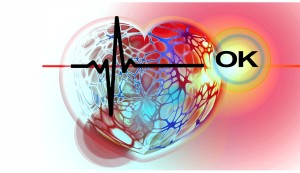Improve Heart Health – It Could Save Your Life.
Scientific evidence proves beyond doubt, being overweight results in an increased risk of heart disease which is the number one killer in the developed world today.
 Ok, that’s not earth shattering news to many people but it has been that way for far too long. The question is though, why are the numbers of overweight people reaching such terrifying proportions worldwide? Especially when it is quite easy to turn this overweight ship around.
Ok, that’s not earth shattering news to many people but it has been that way for far too long. The question is though, why are the numbers of overweight people reaching such terrifying proportions worldwide? Especially when it is quite easy to turn this overweight ship around.
I read recently where Australia is now one of the fattest countries in the world with 63% of people being overweight or obese. As a nation, we really do need to change our ways.
Maybe we (as individuals) just need to be taking better care of our bodies, being more responsible about our lifestyle decisions and following a few basic rules of health health and fitness that will prolong our life and our long term quality of life.
This quote attributed to William H. Johnsen goes a long way to answering the question, “If it is to be it is up to me.”
How Can I tell if I am Overweight?
You need to check your body mass index or BMI. Waist measurements are an excellent guide as well.
Use this online tool to calculate your body mass index (BMI); your health is also at risk if your waist measurements are over 94 cm (37 inches) for men and 80 cm (31.5 inches) for women. The Heart Foundation provides these online instructions for waist measurement.
A body mass index of between 18 and 25 is considered to be normal. A BMI of 25 to 30 means you are overweight and a body mass index above 30 means you are obese. From my experience I have found BMI is not always the best indication of being overweight so combine it with the waist measurement method for a better result.
If you are in the overweight or obese range then it means you urgently need to do something about it by changing your lifestyle and getting into shape through regular exercise and eating real foods which are lower in calories and fat. This will help get your BMI values back into the normal range.
You don’t have to lose a huge amount of weight to lessen your risk of heart attacks and strokes, so every little bit helps. A number of small improvements over a period of time end up with big results so don’t try anything silly like a crash diet.
A weight loss of just 5 to 10% will greatly lessen your risk of the various types of heart disease, including stroke, heart attacks and peripheral vascular disease.
Here’s Some Recent Heart Health Research that’s worth looking at…..
Researchers who published a study in the New England Journal of Medicine found that when you reduce the number of calories you take in, the actual type of diet you choose isn’t as important. This new diet study compares low-carb with low-fat.

It means you are able to eat a low-fat diet, or a low-carb diet, and even a high protein diet, as long as the total calorie count is below that which sustains your weight.
An average person needs between 2000 and 2500 calories per day to sustain their weight.
It isn’t as much about a specific balance of carbs, protein, or fat but depends on the total caloric count per day. Also, keep in mind that if you become very physically active you can actually eat more calories daily and still lose weight.
Weight Statistics
According to the organization that takes measurements of our health (the Centers for Disease Control and Prevention or the CDC) about 66% of adults in the US are considered to be overweight while as many as 1/3 of us are to be considered obese.
These figures are pretty much the same the world over.
If you fall into either of these categories, you will certainly be able to lose weight through calorie reduction and will not become one of the statistics at risk for heart disease.
The Role of Exercise for Heart Health
Besides decreasing your daily calorie intake (and increasing the quality of that calorie intake), you can increase your level of exercise.
You can do this by running, brisk walking, cycling, swimming, or any other activity you enjoy that raises your heart rate and respiratory rate. This is called aerobic exercise and should be done for at least thirty minutes daily 3 to 4 times per week.

You could also look at doing some HIIT training once your fitness levels are high enough. You will also need to consider this question; is HIIT training for everyone?
On the other days of the week, you can do resistance training; this means lifting weights or using specialized pin-weighted exercise machines and even body-weight exercises.
This form of exercise will increase your muscle mass and tone making it easier to lose weight because your basal metabolic rate will be much higher (from the increased muscle mass) causing you to burn more fat even when at rest.
Between the aerobic exercise and resistance training, you will be exercising thirty minutes a day every day of the week. It’s just thirty minutes and won’t take up too much time when compared to the massive health benefits it gives you over the term of your life.
5 Ways Your Heart Responds To Weight Loss?
If you lose just ten percent of your body weight (which is 9 kilos for those who weigh 90 kilos pounds at the moment), your heart will respond accordingly with the following life saving benefits:
1. Your blood vessels will be more elastic.
The blood vessels will be less narrow and will be more elastic when you exercise. This reduces the workload on your heart and will take the stress away so your heart can function more effectively. There will be less fat in your arteries, which collects on the lining of blood vessels, forming plaques that narrow the arteries and can increase the chances that a blood clot will close off the arteries, causing strokes, peripheral vascular disease, and heart attacks.
2. Your blood pressure will be lower.
There is a direct connection between your weight and blood pressure. The lower your weight, the lower is the risk of developing hypertension, which can lead to heart disease. Exercise also lowers blood pressure, which is another reason to include exercise as part of your weight loss program. You can also take medications for hypertension that might need to be reduced if you can successfully lose some weight.
3. Your blood lipids will be lower.
The amount of lipids in your blood will be lower when you lose weight. Losing weight can decrease your triglyceride level, can raise your HDL cholesterol (the good cholesterol), and can lower your LDL cholesterol (the bad cholesterol. All of these changes will improve your heart health.
4. Blood clots will diminish.
If you lose weight, it is less likely that you will develop blood clots, which means your chances of having a blood clot close off an artery will dramatically decrease and the chance a blood clot in your leg could break off, resulting in it travelling to your lungs, brain, and heart.
5. Your belly fat will decrease (the way to go if you want to see your abs).
It turns out that the amount of fat you retain around your belly greatly increases the risk of heart disease.
In a study out of the journal Cardiology, it showed belly fat could contribute to heart disease, even in people who are otherwise of a normal weight. The good news is, by getting rid of belly fat you can reduce your risk of developing this complication.
Unfortunately weight-loss is not always an easy gig. Some people have problems that are genetically based, others have serious medical issues and many medications can cause people to pile on the weight.
 But on the other hand, the bigger percentage of people are following lifestyle choices that leave their bodies in a similar condition to a five year old Hertz rental car.
But on the other hand, the bigger percentage of people are following lifestyle choices that leave their bodies in a similar condition to a five year old Hertz rental car.
This does not have to be the case.
Do something now……..it is never too late to start (unfortunately a lot of people think it is but I can guarantee you…….you can start at any age or in any physical condition; you just have to want to do it).
I urge you to seek professional help if that is what you need to help beat your expanding waistline problem. Whether it be from your family doctor, a nutritionist, psychological help or even a Personal Fitness Trainer. Do it now…..your life could depend on it.
There are many people out there more than willing to help you with your weight-loss problem and lead you down the path to better heart health.
So don’t let it get you down any longer – all you have to do is ask. We are here for you.
Best wishes with your lifestyle changes, healthy eating and better heart health.
Leave a Reply